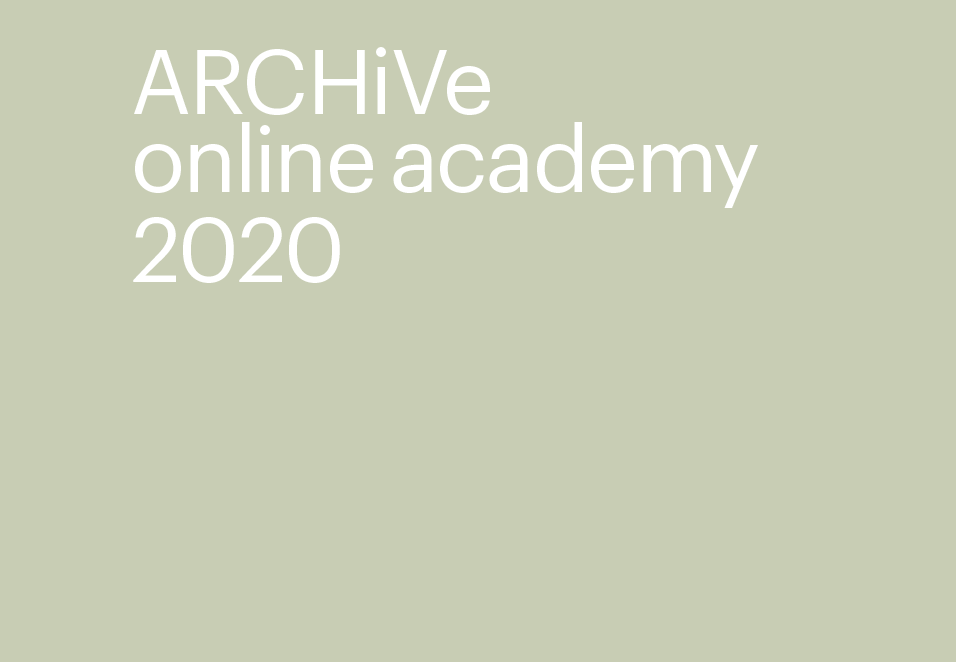
ARCHiVe Online Academy 2020

As part of its ARCHiVe project, the Fondazione Giorgio Cini has organised AOA – ARCHiVe Online Academy, a programme of 7 free courses focused on digitising cultural heritage. The first course, to be held over 3 days, will be Photography applied to digitalisation (5, 7 and 12 May) with Rosario Terranova and Noemi La Pera, final-year students in photography at the Istituto Superiore per le Industrie Artistiche (ISIA), Urbino, and collaborators with ARCHiVe.
The courses in the programme will have a limited number of participants and are addressed to scholars, researchers and anyone wishing to improve their skills in the field of the digital preservation and use of cultural heritage. They will be held on the Zoom digital platform with prior registration required on the Foundation’s website inserire link.
“One of ARCHiVe’s missions is training.” – explains director Andrea Barbon – “At this very difficult time, we have decided to speed up the process of involving the general public by starting online training. Today this is a key tool and we will continue to use it in the future, alternating it with onsite courses. The digital preservation of cultural heritage provides us with a great resource and we want to give future generations useful new tools to be able to explore the works of the past.”
ARCHiVe is a centre dedicated to the technology and digital preservation of cultural heritage on the Island of San Giorgio Maggiore. It was set up in 2018 by the Fondazione Giorgio Cini, the Factum Foundation for Digital Technology in Preservation, and the Digital Humanities Laboratory of the École Polytechnique Fédérale de Lausanne (EPFL-DHLAB), with the Helen Hamlyn Trust as supporting founder.
Complete programme
The first course focuses on photography applied to digitisation with a special emphasis on photographing documentation. The first module on Tuesday 5 May will deal with the rudiments of digital photography and will include a brief examination of the fundamental elements of the camera. The second (May 7) will offer an overview of studio photography, including the characteristics of light and its management, while the basics of digital post-production and the rules for correct digitisation will be tackled on the last day (May 12).
Teachers: Rosario Terranova and Noemi La Pera, final-year students in photography at the Istituto Superiore per le Industrie Artistiche (ISIA), Urbino, and ARCHiVe collaborators.
- Mass digitisation: new approaches and methods (11, 13, 14 and 15 May)
The second course, only for students studying for an ISIA degree at the University of Urbino, will lay the foundations for an understanding of the main issues of mass digitisation and is aimed at building a bridge between the analogical world of archives and the digital world.
Teachers: Guendalina Damone, project manager, Factum Arte Foundation, Andrea Barbon, director ARCHiVe, Remko Bigai, web project manager Mind@ware and ARCHiVe, and Giulia Clera, contact person for archival and digitisation standards and coordinator of ARCHiVe projects.
The third course will analyse some aspects of the main legal issues and possible solutions involved in the digitisation of cultural heritage. The topics will include the impact of copyright on digitisation and making cultural heritage available to the public; and the intersection between personality rights and digitisation and making cultural heritage available to the public. Lastly, the rights to privacy, image and the protection of personal data will be explored in relation to the management of correspondence archives, pictures and documentation of an historical and historiographical nature.
Teachers: Roberto Caso, associate professor at the University of Trento, lecturer in comparative law and delegate for Open Access and anti-plagiarism policies, Paolo Guarda, researcher at the University of Trento, lecturer in comparative law.
The fourth course will explore the notions for a correct post production of images to be used in digitalisation. This involves providing the theoretical tools for the management, development and archiving of image files, as well as illustrating the automatic post production algorithms produced within ARCHiVe.
Teachers: Rosario Terranova and Noemi La Pera, final-year students in photography at the Istituto Superiore per le Industrie Artistiche (ISIA), Urbino, and ARCHiVe collaborators, and Remko Bigai, web project manager, Mind@ware and ARCHiVe.
The fifth course aims to provide an understanding of Semantic Web technologies by exploring the technical aspects, methodologies and tools for the production, publication and querying of LODs, also by analysing a use case. The advantages and potential deriving from sharing information for the development and reuse of cultural data will also be discussed. The course will conclude with a life cycle analysis of Linked Open Data in a use case.
Teacher: Fabiana Guernaccini, knowledge manager and data architect, Regesta.exe
- Audiovisual documentation of events: editing (22, 25, 29 June and 1 July)
The sixth course, only for internal staff who followed the first part of the course in 2019, will deal with the basic theoretical notions of editing in the audiovisual documentation of events; the use of non-linear editing (NLE) DaVinci Resolve (Blackmagic Design) software; and the practical skills required for doing simple audiovisual editing with one or two audio and video sources.
Teachers: Simone Tarsitani, ethnomusicologist and audiovisual specialist at Durham University (UK), and Marco Lutzu, professor of ethnomusicology at the University of Cagliari.
- Preservation of historical sound documents (23 and 30 June, 3, 7, 10, 14 and 17 July).
The seventh course will deal with the complex topic of the preservation of sound documents. Through seven online meetings, which will alternate professional training and workshops, the various stages in the preservation methodology developed over several decades by the University of Padua’s Centre of Computational Sonology (CCS) will be presented in detail.
Teachers: Valentina Burini, Archivio Luigi Nono, Venice, Alessandro Russo, Department of Information Engineering, University of Padua, Sergio Canazza, Department of Information Engineering, University of Padua, scientific director of the CCS laboratory and CEO of AudioInnova srl, and Niccolò Pretto, Institute of Computational Linguistics, CNR, Pisa.
